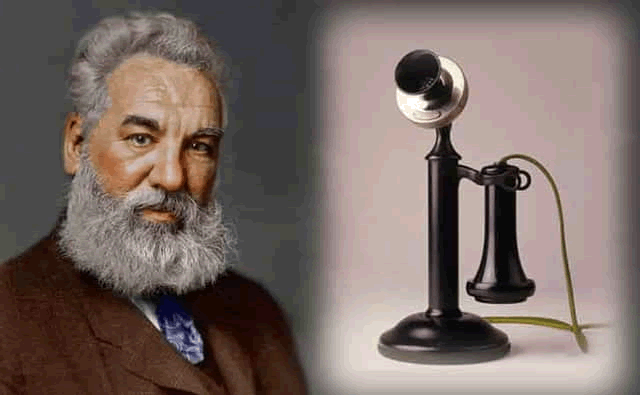Alexander Graham Bell is best known as the inventor of the telephone, a device that forever transformed global communication. Born in Edinburgh, Scotland, on March 3, 1847, Bell’s work in the field of sound and speech ultimately led to one of the most revolutionary inventions in history. His achievements not only changed how we communicate but also laid the foundation for modern telecommunications.
Early Life and Background
Alexander Graham Bell came from a family deeply involved in the study of speech and sound. His father, Alexander Melville Bell, was a professor of speech and elocution, and his grandfather was also a renowned speech expert. As a young boy, Bell was intrigued by the science of sound and how it could be transmitted. His mother was deaf, and this had a profound influence on Bell, encouraging him to develop a deep interest in communication and the mechanics of sound.
In his early years, Bell moved to Canada and then to the United States, where he continued his education and developed his work. Initially, Bell was focused on speech therapy and became a teacher for the deaf. It was his experiences working with the deaf community that led him to invent the telephone, seeking a way to transmit speech electronically.
The Invention of the Telephone (1876)
Bell’s work on the telephone began in the early 1870s when he was exploring ways to transmit the human voice using electrical signals. He was working alongside his assistant, Thomas Watson, and together they developed a system that could convert sound into electrical signals, and then reconvert those signals back into sound at a distant location.
- The First Successful Call: On March 10, 1876, Alexander Graham Bell made his famous first telephone call to his assistant, Thomas Watson. The message was simple but historic: “Mr. Watson, come here, I want to see you.” This was the first time in history that a clear, understandable voice had been transmitted over a wire.
- The Telephone Patent: Bell received the patent for his invention of the telephone on March 7, 1876, a mere few days before his first successful demonstration. The invention of the telephone was a breakthrough in communication, as it allowed people to transmit not just coded messages (as with the telegraph) but also human speech, opening up entirely new possibilities for communication.
The Telephone’s Impact on Society
The telephone quickly gained attention and became a powerful force in the transformation of society, business, and everyday life.
- Early Adoption: The first telephone exchange was established in New Haven, Connecticut, in 1878, and within a few years, telephone networks began to spread across the United States and Europe. The telephone provided a new way for businesses to conduct operations and for individuals to stay in touch over long distances, changing the landscape of communication.
- Expansion of Telephone Networks: As more telephone lines were installed and the technology improved, the telephone became an essential tool for businesses, governments, and private citizens. By the early 20th century, the telephone had expanded across continents and was becoming a global means of communication.
- The Telephone as a Cultural Shift: Bell’s invention also had a deep cultural impact. People could now communicate with others across great distances almost instantly, which had a profound effect on personal relationships, business transactions, and even politics. The telephone helped bridge geographical gaps, turning the world into a more connected and accessible place.
Later Life and Contributions
Although Bell is most famous for inventing the telephone, his contributions to science and technology were broad and far-reaching.
- The Development of Other Technologies: Bell was also interested in other aspects of communication technology. He worked on improving the graphophone, an early version of the phonograph (the predecessor to the record player), and he was involved in early experiments with wireless communication, which would later lead to the development of radio.
- Scientific Endeavors: In addition to his work in communications, Bell made significant contributions to other scientific fields. He helped found the National Geographic Society and was a director of the organization for many years. He also conducted research in aeronautics and helped improve hearing aids for the deaf.
- Legacy in Education and Advocacy: Bell was a lifelong advocate for the deaf and worked closely with organizations for the deaf community. His work as a teacher, inventor, and advocate helped improve education for people with hearing impairments and laid the groundwork for future advancements in speech and hearing technology.
Controversy and the Patent Wars
While Bell is widely credited as the inventor of the telephone, there was significant controversy surrounding the patent. Elisha Gray, a fellow inventor, filed a patent for a similar device on the same day as Bell. The resulting patent dispute led to a legal battle that ultimately saw Bell retain the patent rights. Despite this legal challenge, Bell’s invention of the telephone became widely recognized as a monumental achievement in communication history.
Recognition and Honors
Bell received numerous accolades throughout his life for his work, including honorary degrees, medals, and memberships in various scientific societies. He was inducted into the National Inventors Hall of Fame and was widely celebrated as one of the greatest inventors of his time.
He was also honored by governments and institutions across the world for his invention, which changed the way people communicated forever.
Conclusion: A Legacy of Innovation
Alexander Graham Bell’s invention of the telephone has had an enduring impact on the world. What began as an experiment in transmitting sound over a wire became one of the most important inventions of the 19th century, setting the stage for the development of modern telecommunications, from mobile phones to the internet.
Bell’s curiosity, dedication, and vision not only connected people across the world but also laid the foundation for the technological innovations that continue to shape our lives today. He passed away on August 2, 1922, but his legacy as the inventor of the telephone lives on in the billions of conversations that take place around the world every day.











